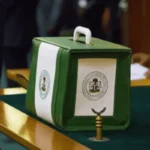The Africa Make Big Polluters Pay (MBPP) partners have expressed deep concern over ongoing discussions surrounding Article 6 of the Paris Agreement, particularly regarding carbon markets, at the COP29 United Nations climate talks in Baku, Azerbaijan.
On November 16, 2024, world governments concluded their work on Article 6 and agreed to forward a draft text for further consideration, guidance, and adoption at COP29. However, the Africa MBPP believes the draft text raises significant issues that must be addressed to ensure equitable and effective climate action.
Article 6 of the Paris Agreement, which outlines how countries can collaborate to achieve their climate targets, includes provisions pushed through at the eleventh hour by the United States and the European Union—that risk placing carbon markets and offsets at the center of the global response to climate change.
In a statement, the partners explained that carbon markets, or emissions trading schemes, allow polluters mostly from the Global North to buy cheap, often “imaginary” pollution allowances from other countries and entities primarily from the Global South, which has contributed the least to climate change.
This system, they argue, enables polluters to continue their harmful activities without accountability, shirking their moral and historical responsibilities while exacerbating the climate crisis.
ALSO READ: COP 29: Tinubu sets up portal to screen govt-sponsored delegates
“It also robs countries and communities in the Global South, including Africa, of the allowances they need to realise their right to grow and develop.
“In other words, those with humongous carbon footprints steal the ability to develop and survive straight from the hands of the countries and communities that have done the least to cause the climate crisis.
“There is also overwhelming evidence that carbon markets do not work and cause great harm. Attempts to launch the world’s biggest trading schemes failed miserably, in part because markets don’t actually decrease emissions; they just shift them around.
The European Union’s emissions trading system (EU-ETS)—often used as the model for most other emissions trading systems has not only failed to decrease emissions but, at one point, even correlated with an increase in emissions,” MBPP said in the statement made available to Nigerian
The statement continued, “The EU-ETS also led to corruption, fraud, speculation, and windfall profits for Big Polluters, which reaped the greatest benefits.
“Yet, it continues to be promoted and replicated as the gold standard.
“Article 6 has been a focal point of contention, particularly the attempts to roll out dangerous global pathways for carbon markets under Articles 6.2 and 6.4 negotiations.
“The Africa MBPP partners stand firmly against carbon markets, as we believe they can undermine the integrity of climate action and disproportionately impact developing nations.
“We commend the efforts of the SBSTA in facilitating discussions but note that the draft text now being proposed does not reflect a consensus among Parties, indicating unresolved divergences that could hinder progress.
“We urge the CMA and COP to reject any text that did not have proper Party consultation as a baseline and any text that further legitimizes these dangerous schemes in light of the abundance of evidence proving their worthlessness and harm.
“We also call for a transparent process that includes all options in the text, ensuring that the concerns of the African Group and Like-Minded Developing Countries (LMDC) are adequately represented.
“Moreover, the contentious issues surrounding authorization changes and the operation of internationally transferred mitigation outcomes remain unresolved.
“As we move forward, we advocate for non-market approaches that align with sustainable development and biodiversity conservation.
“Discussions on Article 6.8 must remain focused on the potential for integrated and holistic approaches that recognize the interconnections between climate change, biodiversity, and the rights of nature.
“We support the recognition of ‘Mother Earth Centric Actions’ and urge Parties to consider these perspectives in the ongoing negotiations.”
The Africa Make Big Polluters Pay Coalition, comprising 27 members from across the continent, reiterated its commitment to holding polluting corporations accountable for their significant contributions to the climate crisis.
WATCH TOP VIDEOS FROM NIGERIAN TRIBUNE TV
- Relationship Hangout: Public vs Private Proposals – Which Truly Wins in Love?
- “No” Is a Complete Sentence: Why You Should Stop Feeling Guilty
- Relationship Hangout: Friendship Talk 2025 – How to Be a Good Friend & Big Questions on Friendship
- Police Overpower Armed Robbers in Ibadan After Fierce Struggle






